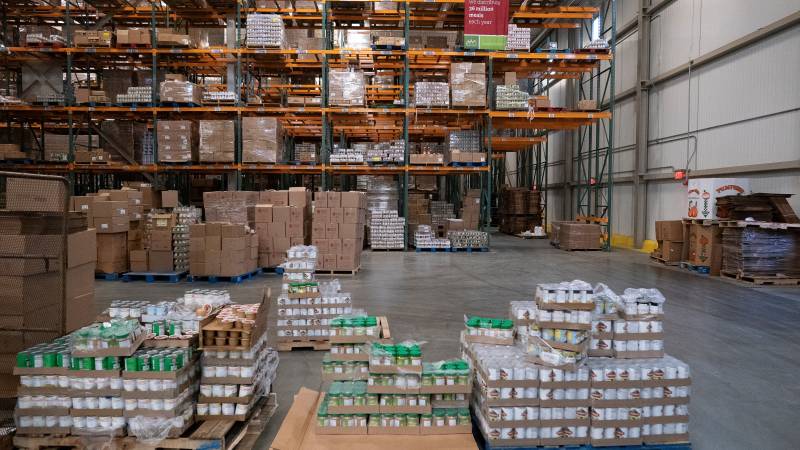At US food banks, a cupboard increasingly bare

Stay tuned with 24 News HD Android App

Donated supplies wait for distribution at the Capital Area Food Bank on April 1, 2020 in Washington, DC. The coronavirus pandemic is putting a strain on US food banks, which are short on volunteers and donations while food requests increase. "Some people are hungrier than ever before and others need to act, help and not be afraid," says Rob Britton, a volunteer at the Washington Area Food Bank (CAFB).
Volunteers are staying home and donations have dried up. The coronavirus pandemic is pressuring US food banks, just as the number of people in need increases.
With Americans told to stay home to help slow the virus's spread, the number of volunteers to sort, package and distribute food for the needy has fallen from 100 to around 40 each day at Washington's Capital Area Food Bank.
Rob Britton is among those who still give up their time to help at the agency's giant warehouse, where stacks of canned and other food are unloaded and packed into smaller boxes for distribution. "With the coronavirus, people are hungrier than ever and other people need to step up, help out, and not be afraid," Britton said.
The volunteers like Britton who remain are the least fearful, or the most motivated. Courtney Thornton is also among them. "Community service is a big part of my life... It makes me feel great to give back," she said. "Times like this, where people are losing their jobs, people need all the help they can get."
The food bank assists about 400,000 people in the US capital region. But since the pandemic took hold and businesses laid off or furloughed their employees, thousands more need help, CAFB president Radha Muthiah told AFP.
At the same time, donations from retailers and wholesalers have fallen by about 50 to 75 percent over the past several weeks. "That base is diminishing. It is dramatic," Muthiah said. "We are purchasing a lot more food."
The situation is equally challenging for the food bank's partners, such as Food & Friends, which delivers meals to the needy. With local governments tightening restrictions on movement, "we know that these restrictions are going to affect the trips the volunteers choose to take," said the agency's executive director, Carrie Stoltzfus. "Many of our individual volunteers have made the hard decision to stay home because they may be at higher risk."
'Every dollar counts'
The agency has more than 2,800 clients, some of whom suffer from severe illnesses that prevent them from moving around. They are also at high risk for COVID-19. With universities closed, Food & Friends has had to endure the loss of student volunteers who used to help in March as part of the "Alternate Spring Break" program, Stoltzfus said.
Those still able to help face new guidelines from Monday, when the number of volunteers in each area of the kitchen has been restricted. Tables are marked to outline six-foot (two-meter) spaces, the distance that health experts recommend should separate people.
With fundraising events cancelled, money has also become a problem since half of Food & Friends' revenue is supported by philanthropy. "These are tough times for all of us. Every dollar counts," Stoltzfus said.
At the food bank, that means "shifting and adapting our model," said Muthiah. This is not a time for icing on the cake, she said. It's the cake they're trying to get out.
They are trying to fill the needs of people now, but realize that the impact of this health and economic crisis will be longer-term. "While we are responding to this epidemic, we are very much looking at the medium and longer effects of this situation," Muthiah said. "We anticipate the impact to be lasting to the next year at least."
